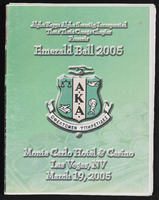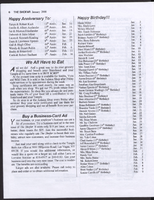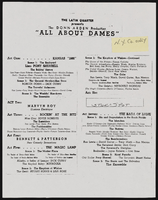Search the Special Collections and Archives Portal
Search Results
Stuart and Flora Mason Photographs
Identifier
Abstract
The Stuart and Flora Mason Photographs (1940-1999) contain photographs of hotels, casinos, and other buildings constructed by Taylor International Corporation, which was owned by the Mason Family. The photographs depict the Aladdin, Venetian, Tropicana, Riviera, MGM Grand, and International hotels and casinos in Las Vegas, Nevada. The photographs also depict buildings in Miami and Coral Gables, Florida, and San Juan, Puerto Rico.
Archival Collection

Alpha Kappa Alpha Sorority, Theta Theta Omega Chapter Founders Day committee reports
Date
Archival Collection
Description
From the Alpha Kappa Alpha Sorority, Incorporated, Theta Theta Omega Chapter Records (MS-01014) -- Chapter records file.
Text

Emerald Ball (Monte Carlo Hotel)
Date
Archival Collection
Description
From the Alpha Kappa Alpha Sorority, Incorporated, Theta Theta Omega Chapter Records (MS-01014) -- Ivy Leaf magazines and event souvenir programs file.
Text

Transcript of interview with Rachel Gibson by Kay Long & Caryll Batt Dziedziak, August 25, 1998
Date
Archival Collection
Description
Rachel Gibson was the granddaughter of Nevada pioneers. Her maternal grandparents, George Rammelkamp and Anna Dougherty, were among the earliest white residents of northern Nevada, settling first in Dayton and later Yerington. Her mother, Clara Angelina, and her two aunts, Elizabeth and Georgie, graduated from the University of Nevada at the turn of the century. Clara taught in Yerington for a number of years before marrying Chase Masterson, a dentist. Rachel was born in 1913 in Yerington. The eldest of three children, she continued the tradition of women’s learning and education that began with her mother’s generation. Her 1930 class was the first to graduate from Las Vegas High School, and soon after Rachel moved to California to attend college. Although her father had counseled her to study law, Rachel chose the field of economics. She received her Bachelor’s degree from the University of California at Berkeley, and worked in San Francisco for one year before returning to complete
Text

Transcript of interview with Sydney Wickliffe by Claytee White, February 1, 2013
Date
Archival Collection
Description
Sydney Wickliffe, nee Botkin, was born in Long Beach, California in 1944. Her parents, Donald and Betty Botkin, moved their young family first to Denver and then to the small town of Ulysses, Kansas before heading for Las Vegas in 1952, when Sydney was eight years old. Since then, she has called Las Vegas her home, graduating from Rancho High School's inaugural senior class in 1962. Growing up in a growing city, Sydney combined an active youth with long hours working in her father's North Las Vegas pharmacy and, later, would earn her degree in accounting from UNLV. As a CPA, she worked as an auditor for the Gaming Control Board and, in 1987, was promoted to deputy chief. From there, she took on the challenging role of director in Nevada's Department of Business and Industry as a member of Governor Kenny Guinn cabinet. As she says, even "one of the north-town girls" can go a long way - and in this interview, she shares memories that help us all see what the Las Vegas she remembers was like in the 1950s and 60s and how it helped to shape the person she is today.
Text

Francisco Aguilar interview, April 19, 2019: transcript
Date
Description
Interviewed by Monserrath Hernández. Francisco 'Cisco' Aguilar is a lawyer and the Founding Chairman of the Cristo Rey St. Viator College Preparatory High School. He talks about growing up in Tucson, Arizona in a Mexican household and continuing his passions to engage in social change as a lawyer. His career and community engagement led him to become a lobbyist, a fellow in Germany, and serve on various committees such as the Catholic Charities Board, Opportunity 180 Board, and the Nevada Athletic Commission. His oral history demonstrates his dedication to providing a future to the Latinx youth of Las Vegas.
Text

Jessica Guiao oral history interview: transcript
Date
Archival Collection
Description
Oral history interview with Jessica Guiao conducted by Grecia Lopez on November 22, 2022 for the Reflections: the Las Vegas Asian American and Pacific Islander Oral History Project. In this interview, Guiao recalls her childhood in Hayward, California, and being raised in Las Vegas, Nevada. She recalls not liking the climate of Nevada at first, and describes the friends she has made throughout her time in the city and the identity she has developed. Guiao discusses some of the pressures and stereotypes surrounding Asian Americans, such as what career path they should pursue or the aversion to embracing subcultures, and how she has consolidated her rebellion into her own identity. Throughout the interview, Guiao touches on other topics such as Filipino food, the long-standing history between Mexican and Filipino communities, Catholicism, goth culture, and anti-Asian hate and racism that she and her family has faced.
Text
Martha C. Knack and Omer C. Stewart Research Papers on the Pyramid Lake Paiute Tribe
Identifier
Abstract
The Martha C. Knack and Omer C. Stewart Research Papers on the Pyramid Lake Paiute Tribe contains materials collected by Stewart and Knack as research for their 1984 book,
Archival Collection


